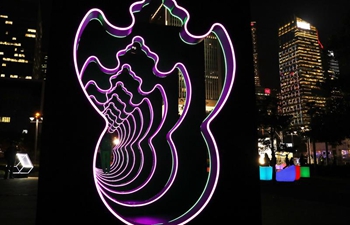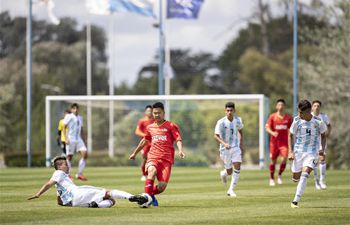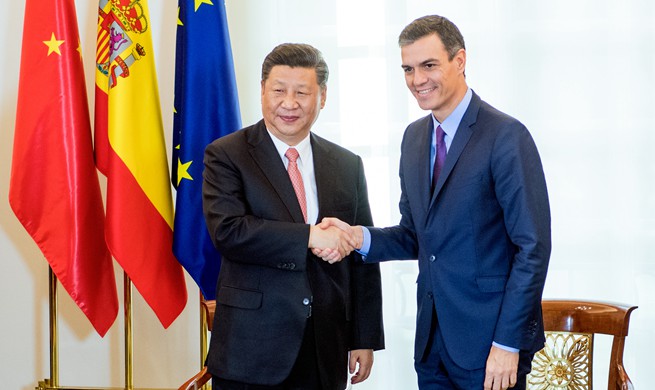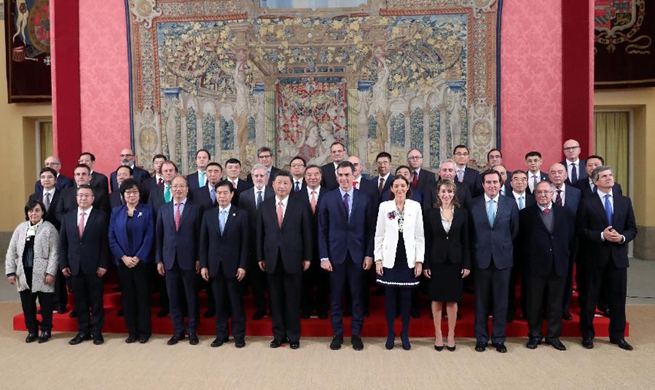by Peter Mertz
SALT LAKE CITY, the United States, Nov. 29 (Xinhua) -- U.S. conservative leaders in the western state of Utah are moving forward to forge deeper bonds with the world's most populous nation, China.
These business, art, and education connections were amplified after a high-level Utah delegation visited the Asian nation last month.
MOVE IN TRADE TURMOIL
"In this time of trade turmoil, the Chinese were big enough to look at the big picture and realize the importance of keeping our alliances alive," said Dan Stephenson, a China expert and Utah businessman who helped lead the high-level local delegation to China.
The Chinese response to the Utah trade delegation that visited China's two largest cities, Beijing and Shanghai, last month was clear and unequivocal: keep trade alive.
"China is Utah's third largest trading partner," said Scott Anderson, CEO and president of Zions Bank, the largest bank in the state.
"Utah companies -- from biomedical, pharma, technology, and food products -- are investing hundreds of millions of dollars in China to support their operations in China," Anderson noted.
Momentum from the two-week mission has already impacted America's 11th largest state, that leads the United States in Chinese language immersion studies and is considered one of the top states in areas of technology and transportation.
This month's Utah Global Forum in state capital Salt Lake City saw an increased Chinese presence, and officials told Xinhua that several Chinese companies are looking at large-scale investments in Utah.
These developments represent a remarkable exception to the hundreds of millions of U.S. dollars of Chinese investment in America that stopped after U.S. tariffs were imposed on an additional 200 billion dollars of Chinese products in July.
"It is a light that shines through the glowering skies," one political insider said of the Utah-China connection.
TECHNOLOGY AND EDUCATION
Utah Speaker of the House Greg Hughes said, "The China-Utah relationship is very important to us in Utah."
Hughes said he was impressed by the "willingness of the (Chinese) Ministry of Foreign Affairs and Ministry of Commerce (to) build bridges and engage in frank and open dialogue."
In Shanghai, the Utah delegation visited the Shanghai Youth Innovation Center in Jiading District, a "first of its kind center" that allows Chinese students to explore a number of "hot ticket" high-tech areas, including robotics and computer coding, and to engage with their Utah peers via web platforms and joint U.S.-China team-based projects.
And with China having the world's top computers and college computer science students, the Utah delegation was quick to take notice of another innovative Chinese approach to the burgeoning AI industry.
"We need a center like that in Utah," one delegation member said, of the facility that attracts the top young tech minds in the nation of nearly 1.4 billion people.
Stephenson also saw "children of migrant workers" involved in state-of-the-art, high-tech activities on the day of the tour. "It was very pleasing to see that equity in Chinese education is as important in China as it is in the United States," he said.
"The ongoing Sister Communities of Learning cooperation between Shanghai's Jiading District and Utah is one way to prepare these students on both sides to increase the future collaboration between China and Utah," Hughes said.
"We are working toward future China-Utah cooperation by preparing our 13,000 Utah K-12 students who are learning Chinese -- to be ready to work for cross-border Utah and Chinese businesses once they join the workforce," he said.
In just the past decade, the sparsely populated state of 3.1 million has successfully integrated Chinese language into its public curriculum like no other state in America.
INLAND PORT PROJECT AND ART
Utah business leaders were taking notes when given an inside tour of the port of Shanghai, which is China's top transport hub. "We met with the Chairman of the Shanghai International Port (Group) in Shanghai to discuss potential partnership opportunities in Utah's Inland Port," said Miles Hansen, president and CEO of Utah's World Trade Center.
Utah's "Inland Port Project," which is called the state's largest-ever economic development endeavor in history, is slated to cover some 20,000 acres west of the capital, Salt Lake City. Utah officials said they hope soon "to host a team of experts from China" to bring first-hand advice from the world's most successful, supersized port.
"We're very hopeful about this cooperation," Stephenson told Xinhua.
Business, money, and trade weren't the only items on the Utah delegation's menu last month. Art and music quickly entered the picture as the group traveled north, to China's capital city, Beijing.
The Beijing-based Central Academy of Fine Arts opened a "one woman show" of Utah artist Susan Swartz with the delegation in attendance, continuing a growing tradition of Utah art and music flowing across the Pacific.
The delegation was also treated to pianist Mary Anne Huntsman performing with Beijing Symphony Orchestra at the academy of fine arts.
"Utah believes that artistic and cultural exchanges can foster trust and understanding and fuel economic ties" between China and the United States, Hughes said.
"Utah has hosted Chinese artists, orchestras, dance groups, and movies to the delight of Utah citizens," Anderson said. "Utah has also sent to China artistic and performing art groups to help foster understanding."
"The U.S. and China have more commonalities than differences, and the two countries are natural allies and friends," said Darin Parker, CEO of PMI Foods, another trade mission participant. Parker's company has deep, long-lasting ties with China and is a global enterprise that supplies an extensive range of food products to international markets.
"Due to this strong history and current ties, both cultural and economic, we look forward to continuing to build a strong foundation with China, its government, and its people," Anderson said.












